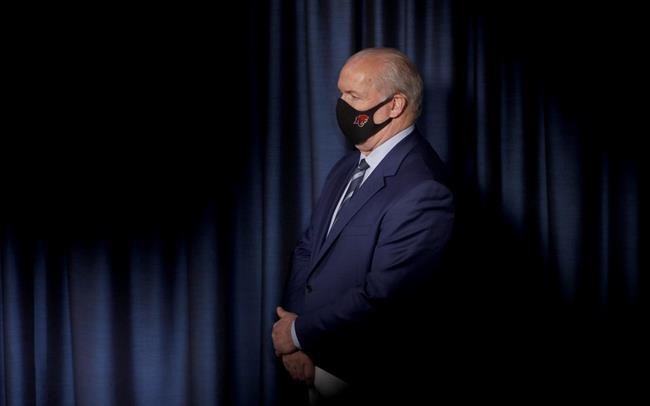VICTORIA — Police officers, grocery workers, teachers and child-care staff are among more than 300,000 front-line workers being prioritized for COVID-19 vaccinations in the coming weeks, the British Columbia government announced Thursday.
Premier John Horgan said they will receive the Oxford-AstraZeneca vaccine as part of the province's plan to inoculate workers who are most at risk of being infected because of barriers to using personal protective equipment and passing the virus on to others in their communities.
"We know this has been an extremely challenging time for front-line workers. While many of us have been able to work remotely or from home, they have gone to work day after day, day after day and they are the true heroes that we want to immunize at this time," Horgan said Thursday.
The government said it expects to receive about 340,000 doses of the AstraZeneca vaccine by the end of May and plans to administer it using a combination of community pharmacists, existing clinics and mobile clinics at some work sites.
Health Minister Adrian Dix said B.C.'s age-based rollout with the Pfizer-BioNTech and Moderna vaccines is ahead of schedule and with the AstraZeneca supply arriving, the province can protect those working in specific front-line industries.
Essential workers in food processing plants and the agricultural sector, for example, including temporary foreign workers employed on farms and living in shared accommodation, are already eligible for early immunization with the AstraZeneca vaccine, as are those working in ski resorts such as Whistler, which has experienced ongoing outbreaks.
Teri Mooring, president of the BC Teachers' Federation, said teachers, support staff and other education workers have done everything they can to make sure schools are safe, but the virus has still found its way into classrooms.
"I join all of my teacher colleagues in expressing huge relief that educators across B.C. will be prioritized in April to receive a COVID-19 vaccine," Mooring said in a statement.
B.C. Association of Chiefs of Police president Howard Chow thanked the government for recognizing the unpredictable work of first responders.
"Police officers in the field are unable to eliminate the risk of exposure because they cannot always practise physical distancing due to the nature of their work," said Chow, who is a deputy chief constable with Vancouver police.
Provincial health officer Dr. Bonnie Henry said specific industries and schools, for example, will be contacted by health authorities to let them know when it's their workers' turn to be vaccinated so they should not be booking appointments through the province's age-based call centres.
"We're doing it based on risk in many areas," she said of the plan expected to start early next month. "We know where some of the hot spots are in the Lower Mainland. Some communities are having more challenges than others."
She said the acceleration of vaccinations will make everyone safer to the point that restrictions could be lifted so young people can have small graduation ceremonies and gatherings of larger numbers of people are possible.
"By the end of June, if we are able to deliver what we are looking at delivering and we're able to keep a third wave from taking off, then we can look at some of those," she said.
About 10 to 12 per cent of COVID-19 cases currently include variants of concern, mostly the one first identified in the United Kingdom.
Henry said the vaccines are effective for those variants, but a daily average of about 500 cases means there's a smaller margin of error when it comes to individual and group actions that could increase the number of infections.
The province reported 622 new cases on Thursday, along with eight more deaths, for a total of 1,419 fatalities since the pandemic began.
As restrictions are eased, gatherings of up to 50 people may resume, the same as last fall, but precautions will need to be taken to avoid close contact among those gathering inside, Henry said.
"As we get more people protected and as we try, hopefully, to get transmission rates down, which means the probability that any one person will have the virus goes down, we'll be able to have larger groups again. But it'll be in a slow and phased approach so we're safe in how we're doing it."
However, gatherings involving international visitors, including weddings, festivals and conferences, will be dangerous this year because vaccines are not available equally around the world, Henry said.
Dr. Penny Ballem, who is leading the province's vaccination program, said B.C. residents, pharmacists and doctors will soon be able to access vaccination records online and five call centres will be closed on April 6 as one central online booking system is opened for everyone making appointments.
All B.C. residents are expected to get their first dose of a vaccine by July.
— By Camille Bains in Vancouver.
This report by The Canadian Press was first published on March 18, 2021.
The Canadian Press




